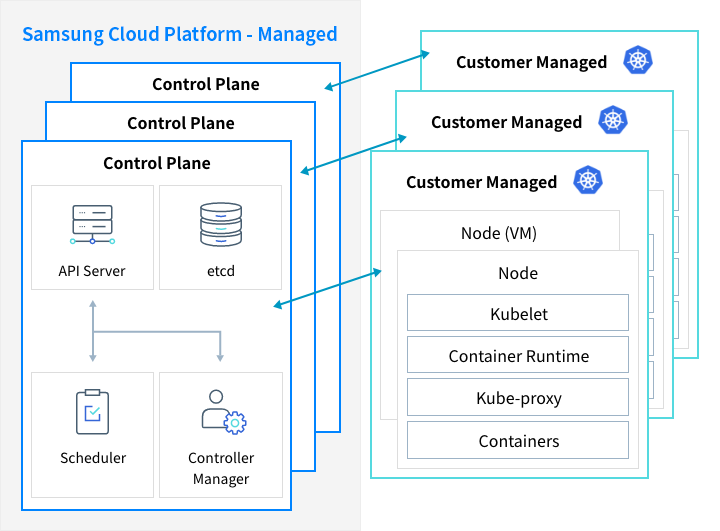
Kubernetes Engine
Kubernetes Container Orchestration Service
Overview


-
Standard Kubernetes Environments
The Kubernetes control plane provides standard Kubernetes environments without separate configuration procedures. The basic offering is compatible with applications in other standard Kubernetes environments to enable usage without code revision.
-
Simple Kubernetes Deployment
Secure communications within worker nodes and control management zones as well as fast provisioning of worker nodes help users to focus on building applications in the provided container environments.
-
Convenient Kubernetes Management
Various convenient management features are offered to use created Kubernetes clusters in the enterprise environment, including cluster data view and cluster management on the dashboard, namespace management, and workload management.
Service Architecture


Control Plane ↔ Customer Managed
- Samsung SDS Cloud Platform - Managed : Control Plane
- API Server ↔ Scheduler
- etcd
- API Server, Scheduler → Controller Manager
- Customer Managed
- Node (VM)
- Node
- Kubelet
- Container Runtime
- Kube-proxy
- Containers
Key Features
-
Standard Kubernetes cluster creation
- Users can use standard Kubernetes services with ease thanks to user definition (VPC/Subnet, Security Group, public endpoint usage File Storage for PV)
- Can establish flexible deployment strategy using multiple node pools
-
Management functions for Kubernetes control
- Kubernetes dashboard : Check the details of the object and controller within a cluster through the Samsung Cloud Platform and create, delete and edit using Kubectl or Yaml editor
- Auto restore : When auto restore mode is on and the node fails to carry out a status check, Samsung Cloud Platform will perform the restoration of the node
- Upgrade : Update the Kubernetes version of cluster and node pool to the latest version (Kubernetes version verified/provided by Samsung Cloud Platform)
- Auto scaling : Based on resource usage amounts such as CPU and memory, automatically scale up/ down the node for application deployment
- Cloud monitoring : Set up and manage events by enabling the health check monitoring of cluster and node
- Providing access control using Kubernetes RBAC (Role-Based Access Control) : Limiting access based on namespace and sub-resources (Kubernetes objects)
Pricing
-
- Billing
- Hourly billing for control plane usage (from creation of cluster to termination request)
※ Management nodes (Kubernetes control planes) provided - Other components excluding control planes are charged separately
· VM for worker node configuration, Storage for PV configuration
· VPC, Load Balancer, and Security Group for user VPC environments
Whether you’re looking for a specific business solution or just need some questions answered, we’re here to help